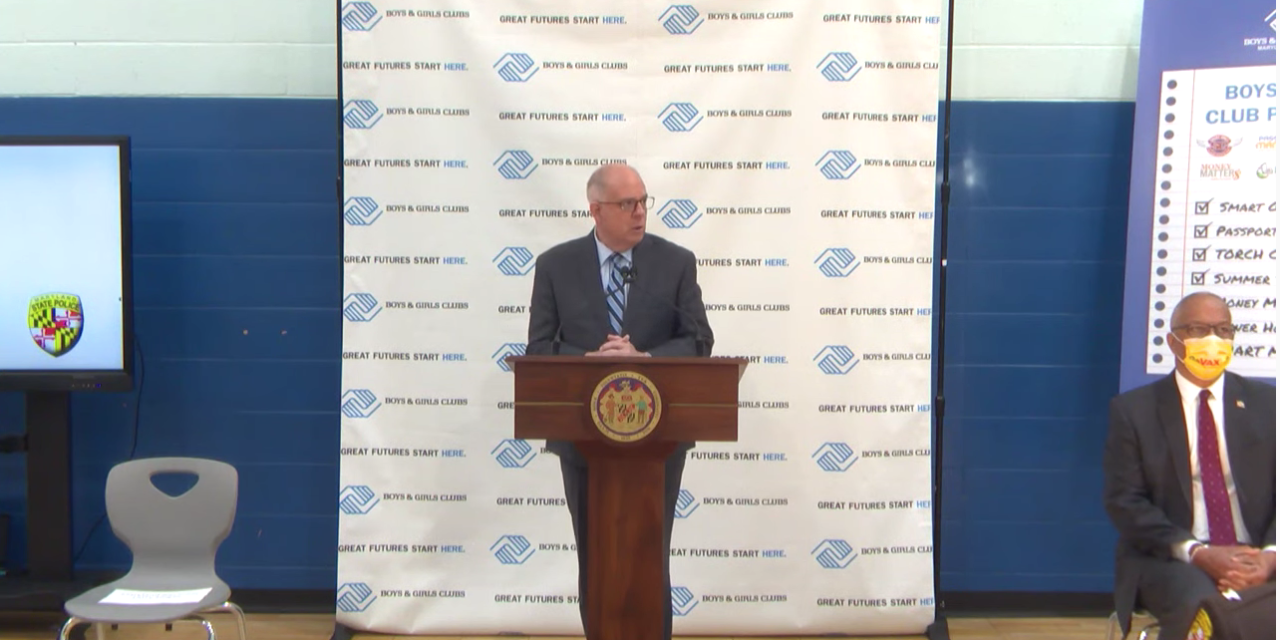@BryanRenbaum
The coronavirus pandemic has had a detrimental impact on the mental health of many of Maryland’s younger people with school closures and the cancellation of both sporting and social events.
This has been especially true for youth that live in the state’s most underserved communities.
To help address this problem the state is entering into a multi-million dollar partnership with several private sector companies to launch a series of initiatives aimed at helping younger people and their families recover from the pandemic, Gov. Larry Hogan said Thursday.
“Today we are launching Project Bounce Back, which is a $25 million first-in-the-nation public-private partnership that will provide a critical support network for Maryland youth and families by harnessing the resources of the Maryland State Department of Education, the Governor’s Office of Crime Prevention, Youth, and Victims Services, LinkedIn Learning, KPMG, Discourse Analytics, and eCare Vault,” Hogan said at a news conference that was held at a youth recreation center in downtown Baltimore.
Hogan added: “The mission of this new initiative is to provide critical services to young people in need and to build post-COVID resilience among Maryland youth, families, and communities. Through Project Bounce Back we will expand the reach of Maryland Alliance of Boys & Girls Clubs to every single county in Maryland prioritizing Title I school districts as well as rural communities in order to reach 45,000 children across all jurisdictions.”
Hogan said the expansion will include a new partnership between the Maryland State Police and the Maryland Alliance of Boys & Girls Clubs in order to “promote positive mentorships and to grow community and police relationships.”
The Maryland State Department of Education will launch “six regional mental health crisis teams composed of counselors, psychologist and experts” to work with schools to provide related services as needed, Hogan said.
And the public-private partnership will the see launch of an “innovative new technology platform” geared toward making it easier for non-profit organizations to assist young people in professional training.
Another important issue related to youth and the pandemic is vaccine hesitancy among that group.
A recent Quinnipiac University poll found that nearly 4-out-1o Americans under age 35 said they are unlikely to get vaccinated for COVID-19.
Baltimore City Health Commissioner Dr. Letitia Dzirasa told MarylandReporter.com in a statement on Thursday that increased educational outreach is the key to convincing young people to get vaccinated.
“Putting the pandemic behind us will require a vaccination effort that touches upon the specific needs and concerns of diverse audiences across all ages, ethnicities, and backgrounds. Focus grouping with younger audiences has shown a need for sustained engagement, not only to educate our younger audiences, but also to authentically demonstrate that their local healthcare institutions care about their well-being beyond the pandemic. Door to door outreach and peer-to-peer engagement will be key to addressing vaccine deliberation in our younger populations, as we work towards reaching herd immunity.”
There are 451,267 confirmed cases of COVID-19 in Maryland as of Thursday morning, according to the Department of Health, and 8,631 people in Maryland have died from the virus. The state’s positivity rate is at 3.66%, which is within CDC recommended guidelines for containment. Maryland has conducted more than 9.8 million COVID-19 tests.
Maryland’s health care providers have administered more than 5 million doses of the coronavirus vaccine. That includes 2,828,179 (46.78%) first doses and 2,023,236 (33.466%) doses. More than 2.2 million people in Maryland are fully vaccinated, which is more than a third of the state’s total population.





Recent Comments